Unit 11 How was your school trip?——2022-2023学年人教版英语七年级下学期期末复习学案(含解析)
文档属性
| 名称 | Unit 11 How was your school trip?——2022-2023学年人教版英语七年级下学期期末复习学案(含解析) | 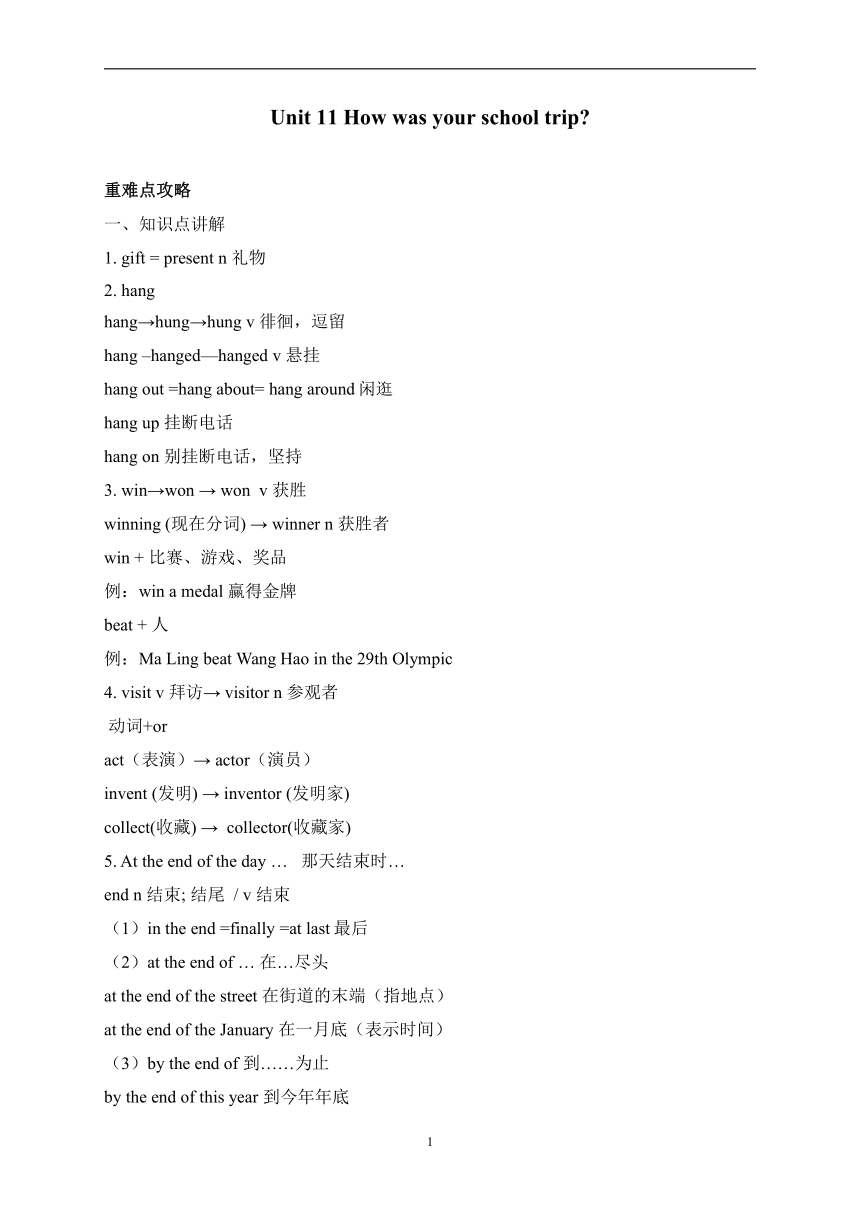 | |
| 格式 | docx | ||
| 文件大小 | 33.6KB | ||
| 资源类型 | 教案 | ||
| 版本资源 | 人教新目标(Go for it)版 | ||
| 科目 | 英语 | ||
| 更新时间 | 2023-06-18 15:09:54 | ||
图片预览

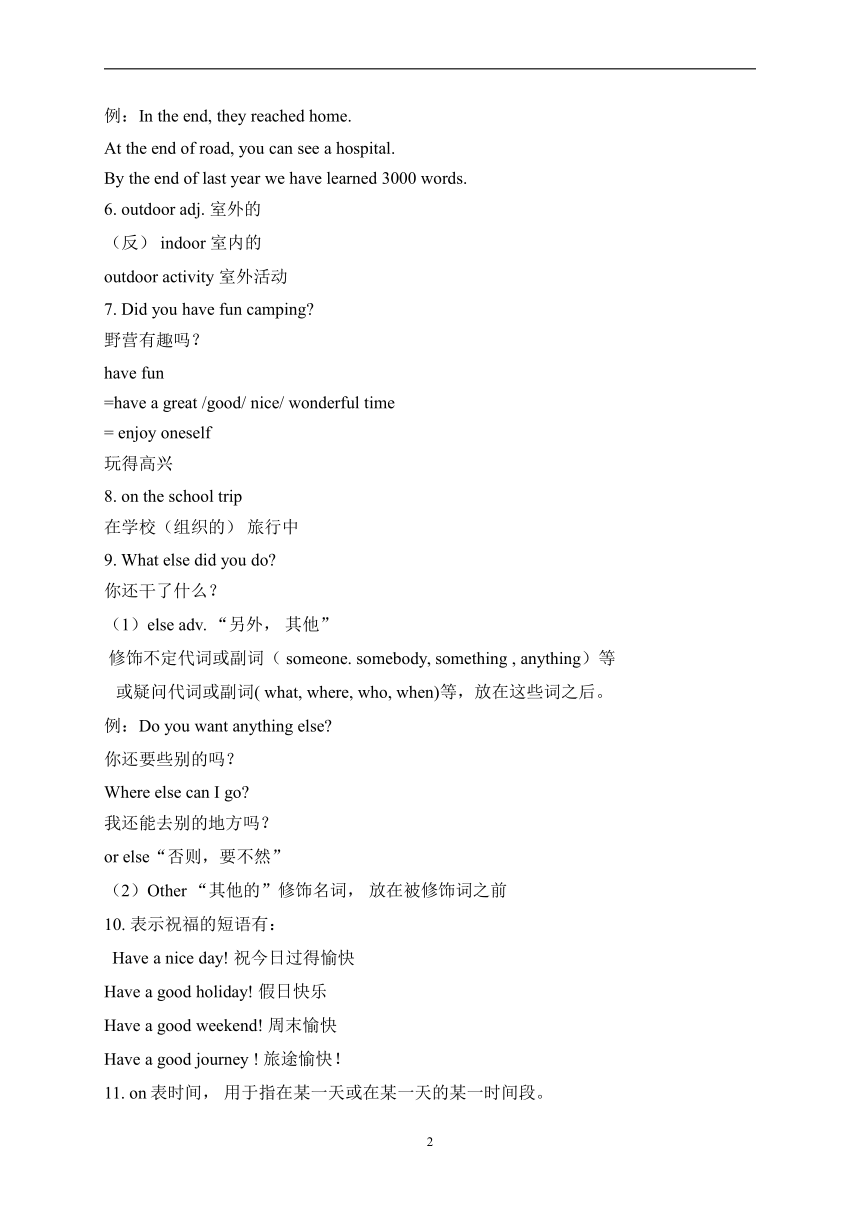
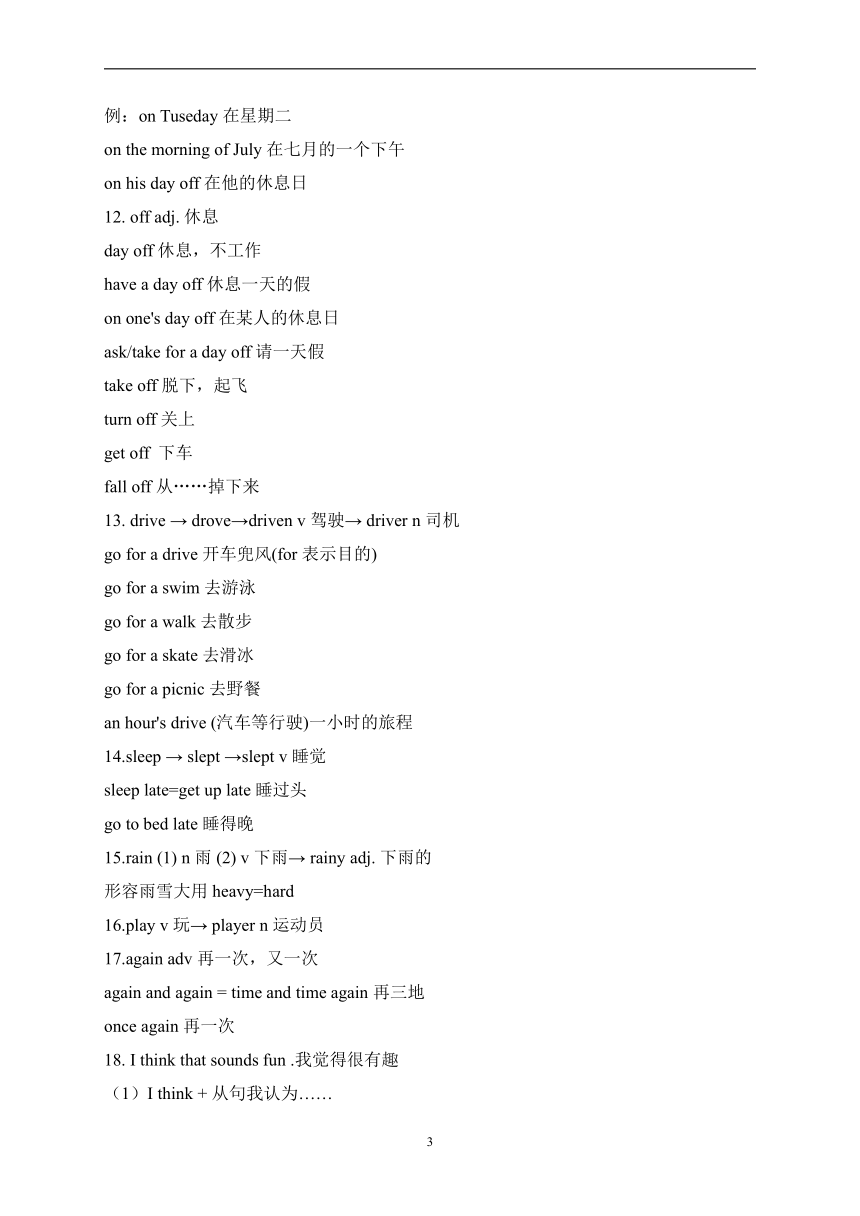
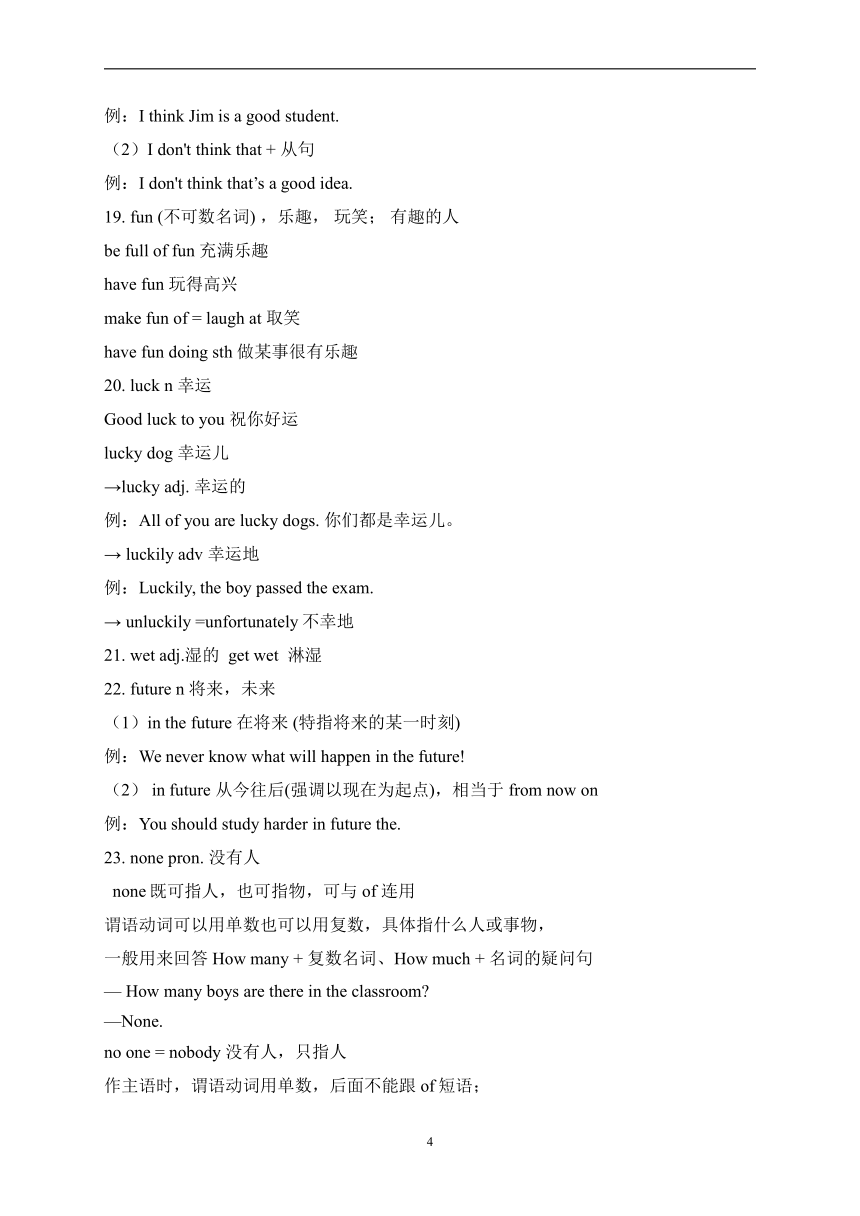
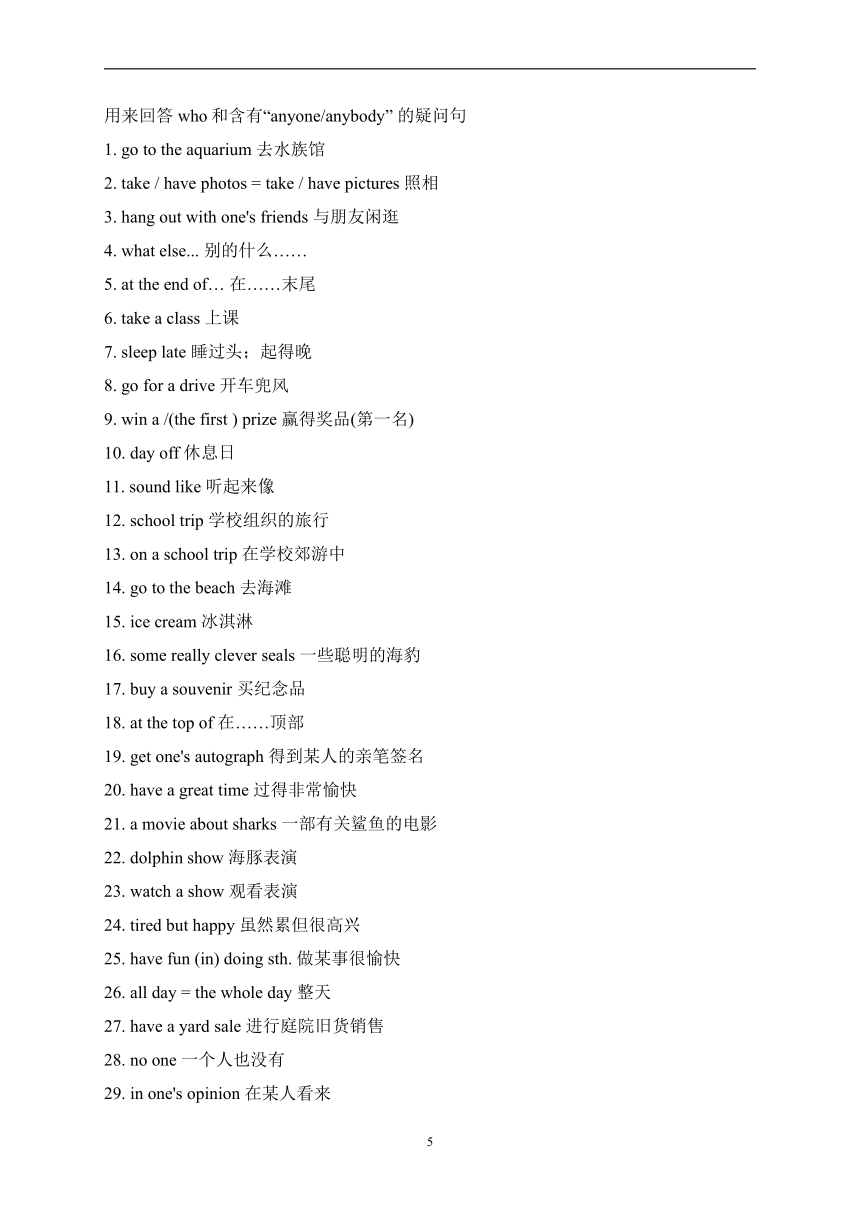
文档简介
Unit 11 How was your school trip
重难点攻略
一、知识点讲解
1. gift = present n 礼物
2. hang
hang→hung→hung v 徘徊,逗留
hang –hanged—hanged v 悬挂
hang out =hang about= hang around闲逛
hang up 挂断电话
hang on 别挂断电话,坚持
3. win→won → won v 获胜
winning (现在分词) → winner n 获胜者
win + 比赛、游戏、奖品
例:win a medal 赢得金牌
beat + 人
例:Ma Ling beat Wang Hao in the 29th Olympic
4. visit v 拜访→ visitor n 参观者
动词+or
act(表演)→ actor(演员)
invent (发明) → inventor (发明家)
collect(收藏) → collector(收藏家)
5. At the end of the day … 那天结束时…
end n 结束; 结尾 / v 结束
(1)in the end =finally =at last最后
(2)at the end of … 在…尽头
at the end of the street 在街道的末端(指地点)
at the end of the January 在一月底(表示时间)
(3)by the end of 到……为止
by the end of this year 到今年年底
例:In the end, they reached home.
At the end of road, you can see a hospital.
By the end of last year we have learned 3000 words.
6. outdoor adj. 室外的
(反) indoor 室内的
outdoor activity 室外活动
7. Did you have fun camping
野营有趣吗?
have fun
=have a great /good/ nice/ wonderful time
= enjoy oneself
玩得高兴
8. on the school trip
在学校(组织的) 旅行中
9. What else did you do
你还干了什么?
(1)else adv. “另外, 其他”
修饰不定代词或副词( someone. somebody, something , anything)等
或疑问代词或副词( what, where, who, when)等,放在这些词之后。
例:Do you want anything else
你还要些别的吗?
Where else can I go
我还能去别的地方吗?
or else“否则,要不然”
(2)Other “其他的”修饰名词, 放在被修饰词之前
10. 表示祝福的短语有:
Have a nice day! 祝今日过得愉快
Have a good holiday! 假日快乐
Have a good weekend! 周末愉快
Have a good journey ! 旅途愉快!
11. on表时间, 用于指在某一天或在某一天的某一时间段。
例:on Tuseday 在星期二
on the morning of July 在七月的一个下午
on his day off 在他的休息日
12. off adj. 休息
day off 休息,不工作
have a day off 休息一天的假
on one's day off 在某人的休息日
ask/take for a day off 请一天假
take off 脱下,起飞
turn off 关上
get off 下车
fall off 从……掉下来
13. drive → drove→driven v 驾驶→ driver n 司机
go for a drive 开车兜风(for 表示目的)
go for a swim 去游泳
go for a walk 去散步
go for a skate 去滑冰
go for a picnic 去野餐
an hour's drive (汽车等行驶)一小时的旅程
14.sleep → slept →slept v 睡觉
sleep late=get up late 睡过头
go to bed late 睡得晚
15.rain (1) n 雨 (2) v 下雨→ rainy adj. 下雨的
形容雨雪大用heavy=hard
16.play v 玩→ player n 运动员
17.again adv 再一次,又一次
again and again = time and time again 再三地
once again 再一次
18. I think that sounds fun .我觉得很有趣
(1)I think + 从句我认为……
例:I think Jim is a good student.
(2)I don't think that + 从句
例:I don't think that’s a good idea.
19. fun (不可数名词) ,乐趣, 玩笑; 有趣的人
be full of fun 充满乐趣
have fun 玩得高兴
make fun of = laugh at 取笑
have fun doing sth 做某事很有乐趣
20. luck n 幸运
Good luck to you 祝你好运
lucky dog 幸运儿
→lucky adj. 幸运的
例:All of you are lucky dogs. 你们都是幸运儿。
→ luckily adv 幸运地
例:Luckily, the boy passed the exam.
→ unluckily =unfortunately不幸地
21. wet adj.湿的 get wet 淋湿
22. future n 将来,未来
(1)in the future 在将来 (特指将来的某一时刻)
例:We never know what will happen in the future!
(2) in future 从今往后(强调以现在为起点),相当于 from now on
例:You should study harder in future the.
23. none pron. 没有人
none既可指人,也可指物,可与of 连用
谓语动词可以用单数也可以用复数,具体指什么人或事物,
一般用来回答How many + 复数名词、How much + 名词的疑问句
— How many boys are there in the classroom
—None.
no one = nobody 没有人,只指人
作主语时,谓语动词用单数,后面不能跟of短语;
用来回答who和含有“anyone/anybody” 的疑问句
1. go to the aquarium 去水族馆
2. take / have photos = take / have pictures 照相
3. hang out with one's friends 与朋友闲逛
4. what else... 别的什么……
5. at the end of… 在……末尾
6. take a class 上课
7. sleep late 睡过头;起得晚
8. go for a drive 开车兜风
9. win a /(the first ) prize 赢得奖品(第一名)
10. day off 休息日
11. sound like 听起来像
12. school trip 学校组织的旅行
13. on a school trip 在学校郊游中
14. go to the beach 去海滩
15. ice cream 冰淇淋
16. some really clever seals 一些聪明的海豹
17. buy a souvenir 买纪念品
18. at the top of 在……顶部
19. get one's autograph 得到某人的亲笔签名
20. have a great time 过得非常愉快
21. a movie about sharks 一部有关鲨鱼的电影
22. dolphin show 海豚表演
23. watch a show 观看表演
24. tired but happy 虽然累但很高兴
25. have fun (in) doing sth. 做某事很愉快
26. all day = the whole day 整天
27. have a yard sale 进行庭院旧货销售
28. no one 一个人也没有
29. in one's opinion 在某人看来
30. See you soon. 再见。
31. in singing competition 在歌咏比赛中
32. a bowl of noodles 一碗面条
33. have sth. for breakfast 早上吃……
34. help sb. (to) do sth. 帮助某人做某事
35. in the future 在将来
36. none of 一个也没有
37. can't help doing sth. 忍不住做某事
二、语法讲解
一般过去时
1. 定义:表示过去某一时间所发生的动作或存在的状态。
谓语动词要用一般过去式。与表示过去的时间状语连用
2. 标志词:
(1)yesterday ( morning, afternoon, evening)(昨天),
the day before yesterday(前天)
(2)last week(上周), last month(上个月), last year(去年),
(3)一段时间+ago two months ago(两个月前),
a moment ago =just now 刚才
(4)表示过去的时间 in 1990 (在1990年), in those days (在那些日子里)。
例:I was born in 1990.
我出生在1990年。
I went to the park last week.
我是上周去的公园。
3. 用法:
(1)Be 动词的一般过去时态,
am is 的过去式为was; are的过去式为were.
当主语是第一人称单数或第三人称单数时,谓语动词用was;
主语是第二人称或其他人称复数时,谓语动词用were。
例:I was in the classroom yesterday morning.
昨天早上我在教室里。
He was at school last Tuesday.
上周二他在学校。
They were over there a moment ago.
刚才他们在那边。
4. 构成:
(1)肯定句:主语+was (were) +表语
例:I was late yesterday. (昨天我迟到了。)
(2)否定句:主语 + wasn't/ weren't + 表语 + 其他
在was/were动词后面加not即可变成否定句,
并且was, were与not可以缩写成wasn't, weren't。
例:I was not (=wasn't) here yesterday.
昨天我不在这儿。
My parents were not (=weren't) at home last Sunday.
上周日我父母不在家
(3)疑问句:Was(Were) + 主语 +表语 + 其他?
把was, were提到句首,句末用问号即可变为一般疑问句
肯定回答用Yes, 主语+was/were.
否定回答用No,主语+wasn't/weren't.
例:Were you ill yesterday
你昨天病了吗?
肯定回答: Yes, I was.
是的,我病了。
否定句: No, I wasn't.
不,我没病。
(4)特殊疑问句: 特殊疑问词+was (were) +主语+其他
例:When were you born
你是什么时候出生的?
5. 实义动词的一般过去时态
肯定句要使用动词的过去式,
否定句和疑问句要使用助动词do和 does 的过去式 did.
(1)肯定句:主语+动词过去式+宾语
例:I went home at nine o'clock yesterday.
我昨天九点钟回的家。
(2)否定句:主语+didn't +动词原形+宾语
例:I didn't go home yesterday.
我昨天没回家。
(3)疑问句:Did +主语+动词原形+宾语
Did you go home yesterday
你昨天回家了吗?
肯定回答: Yes, I did.
是的,我回了。
否定回答:No, I didn't.
不,我没回家。
6. 动词过去式的构成:
规则变化
(1)一般在词尾加-ed
例:walk—walked help—helped
(2)以不发音的e结尾的加d
例:taste—tasted
(3)以辅音字母结尾的动词改y为i加ed
例:study—studied carry—carried
(4)以重读闭音节结尾的动词,双写最后一个字母加ed
例:stop—stopped
不规则变化
例:go – went catch –caught buy –bought
备考满分练
一、单选题
1.—Hi, boys. How was your party yesterday
—Wonderful! We had a big meal and enjoyed _______.
A. themselves B. myself C. yourselves D. ourselves
2.It's getting ________ outside. We had better turn on the light.
A.warm B.windy C.snowy D.dark
3.—The bread is really delicious.
—Thank you. I ______ it myself.
A. make B. made C. will make D. am making
4.Could you say it again I can't understand _____ you are talking about.
A. how B. when C. what D. which
5.I've just returned from my trip to London. I ____ many interesting places there.
A.visit B.will visit C.am visiting D.visited
6.The things in Hong Kong were too . I didn't buy anything when I visited there.
A. excellent B. lucky
C. cheap D. expensive
7.When our teacher heard of the news, he was too angry to say ___________.
A.everything B.nothing C.something D.anything
8.Last night the big fire in Sunshine Shopping Mall was started by children playing with matches. ________, no one was hurt.
A.Luckily B.Suddenly C.Easily D.Sadly
9.—Do you like this new kind of telephone, madam
—Yes. But it's too _______, and I don't have enough money for it.
A.popular B.lovely C.cheap D.expensive
10.—Wasn't Bob supposed to be here
—_____. He will be here in five minutes.
A.No wonder B.All right C.Don't worry D.Enjoy yourself
二、填空题
11.He g (种植)some trees on the mountains last year.
12.The g (导游)can tell you how to get to the top of the mountain
13.L (幸运的是),the rain stopped at last.
14.There are q (相当)a lot of animals on the farm.
15.The houses are too e (昂贵的)for young people.
三、句型转换
16.They went to Yunnan last summer.(对划线部分提问)
______________ ______________ they go to Yunnan
17.John’s weekend was great.(对画线部分提问)
John's weekend
18.She had a good time.(改为一般疑问句)
She a good time
19.Were these chicken hamburgers delicious (作否定回答)
No, .
20.My aunt cooked dinner at home yesterday.(对画线部分提问)
Your aunt at home yesterday
答案以及解析
一、单选题
1.答案:D
解析:考查反身代词词义辨析。 enjoy oneself意为"玩得开心"。根据主语"We"可知用 ourselves。故选D。
2.答案:D
解析:句意:外面天黑了。我们最好把灯打开。考查形容词辨析。warm温暖的;windy有风的;snowy下雪的;dark黑的。根据“We had better turn on the light.”可知,天黑了,要开灯。故选D。
3.答案:B
解析:本题考查动词的时态。——面包真的很好吃。——谢谢,这是我自己做的。做面包这个动作发生在过去,故应用一般过去时。故选B。
4.答案:C
解析:句意:你能再说一遍吗 我不明白你在说什么。how怎样; when什么时候; what什么; which哪一个。故选C。
5.答案:D
解析:根据本题语境可知,"我在那游览了许多有趣的地方"这件事发生在过去,故要用一般过去时。故选D。
6.答案:D
解析:句意:香港的东西太贵了。我去那里时什么也没买。考查形容词辨析。excellent优秀的;lucky幸运的;cheap便宜的;expensive昂贵的,根据“I didn’t buy anything when I visited there”可知,应该是香港的东西太贵。故选D。
7.答案:D
解析:句意:当我们老师听到这个消息时, 他太生气了, 以致于什么也说不出来。考查不定代词。everything每件事,每样东西; nothing没有事,没什么任何东西; something某事,某物,常用于肯定句; anything任何事,任何东西,常用于否定、疑问句中。根据"he was too angry to say...", 可知,他太生气了而不能说出任何话来。故选D。
8.答案:A
解析:句意:昨晚阳光购物中心的大火是孩子们玩火柴引起的。幸运的是,没有人受伤。考查副词辨析。Luckily幸运的是;Suddenly突然;Easily容易地;Sadly悲哀地。根据“no one was hurt.”可知,应该是幸运的是,没有人受伤。故选A。
9.答案:D
解析:popular"广受喜爱的"; lovely"可爱的"; cheap"便宜的"; expensive"昂贵的"。根据题干中的"我买不起"可推断, 它太"昂贵"了, 故所缺的词是expensive。故选D。
10.答案:C
解析:考查交际用语。句意:—难道鲍勃不应该到这里了吗?—______。五分钟后他就会到这里。 No wonder难怪; All right好的;Don't worry不要担心; Enjoy yourself玩得开心。由"五分钟后他就会到这里"可知前面是在提醒"别担心"。故选C。
二、填空题
11.答案:grew
12.答案:guide
13.答案:Luckily
14.答案:quite
15.答案:expensive
三、句型转换
16.答案:When did
17.答案:How was
18.答案:Did; have
19.答案:they weren't
20.答案:What did; do
2
重难点攻略
一、知识点讲解
1. gift = present n 礼物
2. hang
hang→hung→hung v 徘徊,逗留
hang –hanged—hanged v 悬挂
hang out =hang about= hang around闲逛
hang up 挂断电话
hang on 别挂断电话,坚持
3. win→won → won v 获胜
winning (现在分词) → winner n 获胜者
win + 比赛、游戏、奖品
例:win a medal 赢得金牌
beat + 人
例:Ma Ling beat Wang Hao in the 29th Olympic
4. visit v 拜访→ visitor n 参观者
动词+or
act(表演)→ actor(演员)
invent (发明) → inventor (发明家)
collect(收藏) → collector(收藏家)
5. At the end of the day … 那天结束时…
end n 结束; 结尾 / v 结束
(1)in the end =finally =at last最后
(2)at the end of … 在…尽头
at the end of the street 在街道的末端(指地点)
at the end of the January 在一月底(表示时间)
(3)by the end of 到……为止
by the end of this year 到今年年底
例:In the end, they reached home.
At the end of road, you can see a hospital.
By the end of last year we have learned 3000 words.
6. outdoor adj. 室外的
(反) indoor 室内的
outdoor activity 室外活动
7. Did you have fun camping
野营有趣吗?
have fun
=have a great /good/ nice/ wonderful time
= enjoy oneself
玩得高兴
8. on the school trip
在学校(组织的) 旅行中
9. What else did you do
你还干了什么?
(1)else adv. “另外, 其他”
修饰不定代词或副词( someone. somebody, something , anything)等
或疑问代词或副词( what, where, who, when)等,放在这些词之后。
例:Do you want anything else
你还要些别的吗?
Where else can I go
我还能去别的地方吗?
or else“否则,要不然”
(2)Other “其他的”修饰名词, 放在被修饰词之前
10. 表示祝福的短语有:
Have a nice day! 祝今日过得愉快
Have a good holiday! 假日快乐
Have a good weekend! 周末愉快
Have a good journey ! 旅途愉快!
11. on表时间, 用于指在某一天或在某一天的某一时间段。
例:on Tuseday 在星期二
on the morning of July 在七月的一个下午
on his day off 在他的休息日
12. off adj. 休息
day off 休息,不工作
have a day off 休息一天的假
on one's day off 在某人的休息日
ask/take for a day off 请一天假
take off 脱下,起飞
turn off 关上
get off 下车
fall off 从……掉下来
13. drive → drove→driven v 驾驶→ driver n 司机
go for a drive 开车兜风(for 表示目的)
go for a swim 去游泳
go for a walk 去散步
go for a skate 去滑冰
go for a picnic 去野餐
an hour's drive (汽车等行驶)一小时的旅程
14.sleep → slept →slept v 睡觉
sleep late=get up late 睡过头
go to bed late 睡得晚
15.rain (1) n 雨 (2) v 下雨→ rainy adj. 下雨的
形容雨雪大用heavy=hard
16.play v 玩→ player n 运动员
17.again adv 再一次,又一次
again and again = time and time again 再三地
once again 再一次
18. I think that sounds fun .我觉得很有趣
(1)I think + 从句我认为……
例:I think Jim is a good student.
(2)I don't think that + 从句
例:I don't think that’s a good idea.
19. fun (不可数名词) ,乐趣, 玩笑; 有趣的人
be full of fun 充满乐趣
have fun 玩得高兴
make fun of = laugh at 取笑
have fun doing sth 做某事很有乐趣
20. luck n 幸运
Good luck to you 祝你好运
lucky dog 幸运儿
→lucky adj. 幸运的
例:All of you are lucky dogs. 你们都是幸运儿。
→ luckily adv 幸运地
例:Luckily, the boy passed the exam.
→ unluckily =unfortunately不幸地
21. wet adj.湿的 get wet 淋湿
22. future n 将来,未来
(1)in the future 在将来 (特指将来的某一时刻)
例:We never know what will happen in the future!
(2) in future 从今往后(强调以现在为起点),相当于 from now on
例:You should study harder in future the.
23. none pron. 没有人
none既可指人,也可指物,可与of 连用
谓语动词可以用单数也可以用复数,具体指什么人或事物,
一般用来回答How many + 复数名词、How much + 名词的疑问句
— How many boys are there in the classroom
—None.
no one = nobody 没有人,只指人
作主语时,谓语动词用单数,后面不能跟of短语;
用来回答who和含有“anyone/anybody” 的疑问句
1. go to the aquarium 去水族馆
2. take / have photos = take / have pictures 照相
3. hang out with one's friends 与朋友闲逛
4. what else... 别的什么……
5. at the end of… 在……末尾
6. take a class 上课
7. sleep late 睡过头;起得晚
8. go for a drive 开车兜风
9. win a /(the first ) prize 赢得奖品(第一名)
10. day off 休息日
11. sound like 听起来像
12. school trip 学校组织的旅行
13. on a school trip 在学校郊游中
14. go to the beach 去海滩
15. ice cream 冰淇淋
16. some really clever seals 一些聪明的海豹
17. buy a souvenir 买纪念品
18. at the top of 在……顶部
19. get one's autograph 得到某人的亲笔签名
20. have a great time 过得非常愉快
21. a movie about sharks 一部有关鲨鱼的电影
22. dolphin show 海豚表演
23. watch a show 观看表演
24. tired but happy 虽然累但很高兴
25. have fun (in) doing sth. 做某事很愉快
26. all day = the whole day 整天
27. have a yard sale 进行庭院旧货销售
28. no one 一个人也没有
29. in one's opinion 在某人看来
30. See you soon. 再见。
31. in singing competition 在歌咏比赛中
32. a bowl of noodles 一碗面条
33. have sth. for breakfast 早上吃……
34. help sb. (to) do sth. 帮助某人做某事
35. in the future 在将来
36. none of 一个也没有
37. can't help doing sth. 忍不住做某事
二、语法讲解
一般过去时
1. 定义:表示过去某一时间所发生的动作或存在的状态。
谓语动词要用一般过去式。与表示过去的时间状语连用
2. 标志词:
(1)yesterday ( morning, afternoon, evening)(昨天),
the day before yesterday(前天)
(2)last week(上周), last month(上个月), last year(去年),
(3)一段时间+ago two months ago(两个月前),
a moment ago =just now 刚才
(4)表示过去的时间 in 1990 (在1990年), in those days (在那些日子里)。
例:I was born in 1990.
我出生在1990年。
I went to the park last week.
我是上周去的公园。
3. 用法:
(1)Be 动词的一般过去时态,
am is 的过去式为was; are的过去式为were.
当主语是第一人称单数或第三人称单数时,谓语动词用was;
主语是第二人称或其他人称复数时,谓语动词用were。
例:I was in the classroom yesterday morning.
昨天早上我在教室里。
He was at school last Tuesday.
上周二他在学校。
They were over there a moment ago.
刚才他们在那边。
4. 构成:
(1)肯定句:主语+was (were) +表语
例:I was late yesterday. (昨天我迟到了。)
(2)否定句:主语 + wasn't/ weren't + 表语 + 其他
在was/were动词后面加not即可变成否定句,
并且was, were与not可以缩写成wasn't, weren't。
例:I was not (=wasn't) here yesterday.
昨天我不在这儿。
My parents were not (=weren't) at home last Sunday.
上周日我父母不在家
(3)疑问句:Was(Were) + 主语 +表语 + 其他?
把was, were提到句首,句末用问号即可变为一般疑问句
肯定回答用Yes, 主语+was/were.
否定回答用No,主语+wasn't/weren't.
例:Were you ill yesterday
你昨天病了吗?
肯定回答: Yes, I was.
是的,我病了。
否定句: No, I wasn't.
不,我没病。
(4)特殊疑问句: 特殊疑问词+was (were) +主语+其他
例:When were you born
你是什么时候出生的?
5. 实义动词的一般过去时态
肯定句要使用动词的过去式,
否定句和疑问句要使用助动词do和 does 的过去式 did.
(1)肯定句:主语+动词过去式+宾语
例:I went home at nine o'clock yesterday.
我昨天九点钟回的家。
(2)否定句:主语+didn't +动词原形+宾语
例:I didn't go home yesterday.
我昨天没回家。
(3)疑问句:Did +主语+动词原形+宾语
Did you go home yesterday
你昨天回家了吗?
肯定回答: Yes, I did.
是的,我回了。
否定回答:No, I didn't.
不,我没回家。
6. 动词过去式的构成:
规则变化
(1)一般在词尾加-ed
例:walk—walked help—helped
(2)以不发音的e结尾的加d
例:taste—tasted
(3)以辅音字母结尾的动词改y为i加ed
例:study—studied carry—carried
(4)以重读闭音节结尾的动词,双写最后一个字母加ed
例:stop—stopped
不规则变化
例:go – went catch –caught buy –bought
备考满分练
一、单选题
1.—Hi, boys. How was your party yesterday
—Wonderful! We had a big meal and enjoyed _______.
A. themselves B. myself C. yourselves D. ourselves
2.It's getting ________ outside. We had better turn on the light.
A.warm B.windy C.snowy D.dark
3.—The bread is really delicious.
—Thank you. I ______ it myself.
A. make B. made C. will make D. am making
4.Could you say it again I can't understand _____ you are talking about.
A. how B. when C. what D. which
5.I've just returned from my trip to London. I ____ many interesting places there.
A.visit B.will visit C.am visiting D.visited
6.The things in Hong Kong were too . I didn't buy anything when I visited there.
A. excellent B. lucky
C. cheap D. expensive
7.When our teacher heard of the news, he was too angry to say ___________.
A.everything B.nothing C.something D.anything
8.Last night the big fire in Sunshine Shopping Mall was started by children playing with matches. ________, no one was hurt.
A.Luckily B.Suddenly C.Easily D.Sadly
9.—Do you like this new kind of telephone, madam
—Yes. But it's too _______, and I don't have enough money for it.
A.popular B.lovely C.cheap D.expensive
10.—Wasn't Bob supposed to be here
—_____. He will be here in five minutes.
A.No wonder B.All right C.Don't worry D.Enjoy yourself
二、填空题
11.He g (种植)some trees on the mountains last year.
12.The g (导游)can tell you how to get to the top of the mountain
13.L (幸运的是),the rain stopped at last.
14.There are q (相当)a lot of animals on the farm.
15.The houses are too e (昂贵的)for young people.
三、句型转换
16.They went to Yunnan last summer.(对划线部分提问)
______________ ______________ they go to Yunnan
17.John’s weekend was great.(对画线部分提问)
John's weekend
18.She had a good time.(改为一般疑问句)
She a good time
19.Were these chicken hamburgers delicious (作否定回答)
No, .
20.My aunt cooked dinner at home yesterday.(对画线部分提问)
Your aunt at home yesterday
答案以及解析
一、单选题
1.答案:D
解析:考查反身代词词义辨析。 enjoy oneself意为"玩得开心"。根据主语"We"可知用 ourselves。故选D。
2.答案:D
解析:句意:外面天黑了。我们最好把灯打开。考查形容词辨析。warm温暖的;windy有风的;snowy下雪的;dark黑的。根据“We had better turn on the light.”可知,天黑了,要开灯。故选D。
3.答案:B
解析:本题考查动词的时态。——面包真的很好吃。——谢谢,这是我自己做的。做面包这个动作发生在过去,故应用一般过去时。故选B。
4.答案:C
解析:句意:你能再说一遍吗 我不明白你在说什么。how怎样; when什么时候; what什么; which哪一个。故选C。
5.答案:D
解析:根据本题语境可知,"我在那游览了许多有趣的地方"这件事发生在过去,故要用一般过去时。故选D。
6.答案:D
解析:句意:香港的东西太贵了。我去那里时什么也没买。考查形容词辨析。excellent优秀的;lucky幸运的;cheap便宜的;expensive昂贵的,根据“I didn’t buy anything when I visited there”可知,应该是香港的东西太贵。故选D。
7.答案:D
解析:句意:当我们老师听到这个消息时, 他太生气了, 以致于什么也说不出来。考查不定代词。everything每件事,每样东西; nothing没有事,没什么任何东西; something某事,某物,常用于肯定句; anything任何事,任何东西,常用于否定、疑问句中。根据"he was too angry to say...", 可知,他太生气了而不能说出任何话来。故选D。
8.答案:A
解析:句意:昨晚阳光购物中心的大火是孩子们玩火柴引起的。幸运的是,没有人受伤。考查副词辨析。Luckily幸运的是;Suddenly突然;Easily容易地;Sadly悲哀地。根据“no one was hurt.”可知,应该是幸运的是,没有人受伤。故选A。
9.答案:D
解析:popular"广受喜爱的"; lovely"可爱的"; cheap"便宜的"; expensive"昂贵的"。根据题干中的"我买不起"可推断, 它太"昂贵"了, 故所缺的词是expensive。故选D。
10.答案:C
解析:考查交际用语。句意:—难道鲍勃不应该到这里了吗?—______。五分钟后他就会到这里。 No wonder难怪; All right好的;Don't worry不要担心; Enjoy yourself玩得开心。由"五分钟后他就会到这里"可知前面是在提醒"别担心"。故选C。
二、填空题
11.答案:grew
12.答案:guide
13.答案:Luckily
14.答案:quite
15.答案:expensive
三、句型转换
16.答案:When did
17.答案:How was
18.答案:Did; have
19.答案:they weren't
20.答案:What did; do
2
同课章节目录
